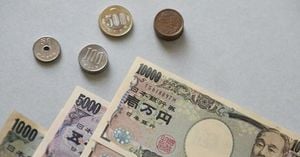The Japanese government has ramped up its pressure on the United States to eliminate additional taxes on automobiles and reciprocal tariffs in ongoing bilateral negotiations aimed at achieving a mutually beneficial agreement. Despite Japan's insistence, Washington has excluded automobiles and other critical items from the negotiation scope, compelling Tokyo to hold firm on its demand for the removal of all tariffs, including those on auto parts.
During a meeting on May 5, 2025, Prime Minister Shigeru Ishiba discussed the situation with Minister of Economic Revitalization Ryosei Akazawa, who had just returned from the second round of ministerial-level negotiations in the U.S. Ishiba instructed Akazawa on the next steps in negotiations based on the outcomes of previous discussions. He emphasized the need for a strategic negotiation plan that is both "quickly and meticulously" executed.
"There is still a large gap between the positions of Japan and the United States; currently, we do not have a common voice," Ishiba told reporters following the meeting. He urged the U.S. to negotiate on all tariffs, including those on automobiles, steel, and aluminum, highlighting the importance of these discussions for Japan's economy.
"The new taxes on auto parts are extremely regrettable," Ishiba remarked, reaffirming Japan's commitment to demanding the U.S. end these tariffs. The Trump administration has confined negotiations to the additional reciprocal tariff of 24% imposed on Japan, while excluding the crucial taxes on automobiles, steel, and aluminum from the talks.
Unlike reciprocal tariffs, the auto tax is a fixed 25% tax that applies uniformly to all countries. Washington has made it clear that it will not provide Japan with special treatment in this regard. The auto industry is a cornerstone of Japan's economy, with a vast supply chain supporting parts manufacturers. Continued U.S. tariffs could potentially stall the entire Japanese economy, as the automotive sector is a significant source of exports to the U.S.
In a strategic move, Tokyo is contemplating a plan to increase the number of imported cars under a preferential certification system known as PHP, which may serve as a bargaining chip in the tariff negotiations with the U.S.
Speaking to reporters at Haneda Airport shortly after returning from the U.S. on May 3, 2025, Minister Akazawa disclosed that working-level negotiations commenced in the U.S. on May 2, emphasizing the importance of addressing individual issues and technical details. He expressed hope that the two sides could resolve their disagreements during these discussions before progressing towards a formal agreement.
When asked about the possibility of reaching an agreement by June, Akazawa responded, "It would be excellent if we could enter that phase." He also noted that a mutually beneficial agreement could only be achieved when there is consensus between both parties, cautioning against making premature claims about progress.
The U.S. has rejected Japan's request for a complete exemption from the 10% "reciprocal" tax and the nation-specific tax, as reported by Kyodo News. In recent negotiations, U.S. officials, including Treasury Secretary Scott Bessent, informed Akazawa that the Trump administration is only prepared to consider a 14% reduction in the nation-specific tax, which has been suspended until early July 2025.
During the second round of negotiations, U.S. representatives emphasized that they would only contemplate extending the 90-day suspension or reducing the tax by 14% based on the negotiations' progress. Japan has been lobbying for the complete removal of the "reciprocal" tax, which includes the additional 25% tax on automobiles and the 25% tax on steel and aluminum.
The U.S. has made it clear that it will not negotiate the 10% global basic tax or the tariffs on automobiles and steel products. Furthermore, U.S. officials expressed dissatisfaction with the number of cars manufactured in the U.S. that are imported into Japan, urging the country to open its market to a broader range of U.S. agricultural products during the first round of negotiations in mid-April 2025.
Japan has been prioritized in the U.S. negotiations concerning tariff increases, being one of the first countries to engage in discussions following President Trump's implementation of reciprocal tariffs on nearly all trading partners. The first tariff negotiation took place on April 16, 2025, with President Trump unexpectedly participating alongside Minister Akazawa.
Both Japan and the U.S. have agreed to hold a series of in-depth ministerial-level meetings starting in mid-May 2025, with the possibility of Prime Minister Ishiba meeting with President Trump on the sidelines of the G7 Summit, scheduled for June 15-17, 2025, in Canada. This summit could provide a crucial platform for further discussions on the ongoing trade negotiations.
As the negotiations unfold, the stakes remain high for both nations. Japan's automotive industry, essential to its economy, is closely intertwined with U.S. markets. The outcome of these discussions could significantly impact not only bilateral relations but also the broader economic landscape of both countries.



